- Home
- Dornford Yates
Gale Warning
Gale Warning Read online
Copyright & Information
Gale Warning
First published in 1939
© Estate of Dornford Yates; House of Stratus 1939-2011
All rights reserved. No part of this publication may be reproduced, stored in a retrieval system, or transmitted, in any form, or by any means (electronic, mechanical, photocopying, recording, or otherwise), without the prior permission of the publisher. Any person who does any unauthorised act in relation to this publication may be liable to criminal prosecution and civil claims for damages.
The right of Dornford Yates to be identified as the author of this work has been asserted.
This edition published in 2011 by House of Stratus, an imprint of
Stratus Books Ltd., Lisandra House, Fore Street, Looe,
Cornwall, PL13 1AD, UK.
Typeset by House of Stratus.
A catalogue record for this book is available from the British Library and the Library of Congress.
EAN ISBN Edition
184232974X 9781842329740 Print
0755126947 9780755126941 Kindle
0755127153 9780755127153 Epub
This is a fictional work and all characters are drawn from the author’s imagination.
Any resemblance or similarities to persons either living or dead are entirely coincidental.
www.houseofstratus.com
About the Author
Born ‘Cecil William Mercer’ into a middle class Victorian family with many Victorian skeletons in the closet, including the conviction for embezzlement from a law firm and subsequent suicide of his great-uncle, Yates’ parents somehow scraped together enough money to send him to Harrow.
The son of a solicitor, he at first could not seek a call to the Bar as he gained only a third class degree at Oxford. However, after a spell in a Solicitor’s office he managed to qualify and then practised as a Barrister, including an involvement in the Dr. Crippen Case, but whilst still finding time to contribute stories to the Windsor Magazine.
After the First World War, Yates gave up legal work in favour of writing, which had become his great passion, and completed some thirty books. These ranged from light-hearted farce to adventure thrillers. For the former, he created the ‘Berry’ books which established Yates’ reputation as a writer of witty, upper-crust romances. For the latter, he created the character Richard Chandos, who recounts the adventures of Jonah Mansel, a classic gentleman sleuth. As a consequence of his education and experience, Yates’ books feature the genteel life, a nostalgic glimpse at Edwardian decadence and a number of swindling solicitors.
In his hey day, and as testament to his fine writing, Dornford Yates’ work often featured in the bestseller list. Indeed, ‘Berry’ is one of the great comic creations of twentieth century fiction; the ‘Chandos’ titles also being successfully adapted for television. Along with Sapper and John Buchan, Yates dominated the adventure book market of the inter war years.
Finding the English climate utterly unbearable, Yates chose to live in the French Pyrenées for eighteen years, before moving on to Rhodesia (as was), where he died in 1960.
‘Mr Yates can be recommended to anyone who thinks the British take themselves too seriously.’ - Punch
‘We appreciate fine writing when we come across it, and a wit that is ageless united to a courtesy that is extinct’ - Cyril Connolly
Dedication
To Jill
to whom I owe so much
1: Without the Law
I think I might have made a good land agent, but I know of no other calling which I should have failed to disgrace. In a sense this was not my fault, for my father was a land agent, as had been his father before him, and I was brought up in the tradition almost from the day of my birth. Then, when I was twenty-two, my father and his master were killed by a falling tree, and the proud estate – my world – was sold to a man of affairs and was turned into building-plots.
It was nearly two years later, when I was on my beam-ends, that George St Omer of Peerless stifled a yawn.
“I’m going to bed,” he said; and got to his feet. With a hand on the door, he turned. “By the way, I’m parting with Collis. I’ve told him to leave next June. And I want you to take his place – at six hundred a year.”
Before I could find my tongue, he was out of the room.
Now Collis was land agent of Peerless, which had been the seat of the Earls of St Omer for more than three centuries.
George lived by himself at Peerless, in great simplicity. Where his father had kept forty servants, he kept a man and his wife, and he lived in the servants’ quarters of his ancestral home. But death duties have to be paid, and the money he saved indoors was spent upon the acres without. He grudged the estate nothing – he once sold his favourite hunter to buy a barn a new roof: but love is not expert knowledge, and so he employed a land agent – not to spare himself, but for Peerless’ sake.
I had stayed with him several times since his father’s death, and when he made the announcement which I have reported above, I was spending a week at Peerless and hunting three days out of six.
When I tried to thank him next morning, he closed one eye.
“Mathematics, my boy,” he said. “I’m a business man. You’ll be very much better than Collis – and cheaper, too. I pay him eight hundred a year, and he’s worth about four. So you stand by for June. We’ll meet in Town in the spring and fix things up.”
(He never told me the truth – that he had caught Collis clean out. The fellow had been robbing St Omer right and left. But George would not prosecute or even discharge the man, because his sudden dismissal would have prejudiced what future he had.)
All I had in the world at that time was a capital sum of four hundred and fifty pounds, but I was determined to pull my weight at Peerless and, in view of the well-paid post so soon to be mine, I arranged to take a course of instruction which should, so to speak, put an edge to my ability. The fees were high, and I had to live in a style which I could not afford; but I made out that I could just do it – and have some twenty pounds over, when June came in.
No man ever worked harder than I did that winter and spring: I applied myself unto wisdom with all my might. And then, one April morning, my summons from George arrived in the form of a telegram.
Let’s dine at Scotts tomorrow is that all right
I replied by wire that it was – and travelled to Town the next day with a leaping heart, eager to make George free of the dreams I had woven for Peerless out of the stuff I had learned.
I reached the restaurant early, to find, as I had expected, that George had reserved an alcove, where we could talk undisturbed: so I sent for an evening paper and took my seat – with my face to the busy staircase down which St Omer must come.
Then a boy came down with the paper…
It was the latest edition – the ‘late night extra,’ I think – the first to publish the news of St Omer’s death.
His car had overturned that same afternoon…not very far from Bedford…whilst he was driving to London…to meet me at Scott’s. George was lying dead at a wayside inn. And here was I at his table…waiting to talk of Peerless and see the smile in his eyes and show him that I was the man for the post I should never fill.
How long I sat staring at the paper, I do not know, for I was, so to speak, knocked out. I had lost my familiar friend, the only friend I had had – not that I needed others: one friend like George St Omer was as much as a man can ask. I had lost my admirable Crichton – the man who did all things well, all of whose ways were so handsome, to whom I had always looked up. I had lost my deus ex machina – the man who had come to my help, who was to have made my fortune… ‘Was to have.’ My prospects had died with George. The time and the money which I had spent on
my course had been thrown away. And now I was ‘up against it’ as never before. And so, as I say, I sat staring, oblivious of time and place, when the casual words of a stranger cleared my brain.
“I wish you’d got an alcove,” he said.
As the head waiter began to express his regret—
“This one’s free,” said I, and got to my feet.
The head waiter opened his eyes.
“Isn’t his lordship—”
“His lordship’s dead,” I said.
“Dead, sir?”
I picked up the paper and put it into his hand. Then I took my coat and hat and made my way up the staircase down which George would never come.
It was a rough, wet night and I hung on my heel for a moment, to put on my coat before I took to the streets. As I did so, a hand on my shoulder made me look round.
By my side was standing the stranger to whom, a moment before, I had given the alcove up.
“I think you’re John Bagot,” he said.
“Yes,” said I, staring. “I am.”
“Well, my name’s Mansel,” he said. “And I was a friend of St Omer’s – I knew him extremely well. He was speaking of you last week. Please come back and dine with me. His death has shaken me up, and as you knew him so well – well, I think perhaps it’d be a relief to us both.”
“You’re very good,” said I, “to try and temper the wind. But—”
“Please come – for my sake,” said Mansel. And then, “I mean what I say.”
“But you’re not alone,” said I.
“No, a man called Chandos is coming. But that won’t matter at all. He knew George better than I.”
I confess that I felt something dazed, and a hand went up to my head.
Then—
“All right,” I said, and turned. “Did you know he was dining here?”
“Yes,” said Mansel, “I did. And I knew you were dining with him. After you’d dined together, he was to have brought you along to meet Chandos and me.”
Then he slid an arm under mine and led me back down the staircase which George would never descend. And soon after that I was drinking a champagne cocktail in the alcove which George had reserved.
Dinner was a thing of the past, and Mansel, Chandos and I were sitting in Mansel’s flat in Cleveland Row.
Mansel was addressing me quietly.
“I said I had something to tell you, and here it is. George met his death today, but not by an accident. That is the verdict which the coroner’s jury will return. But Chandos and I know better. St Omer has been bumped off.”
I heard myself say, “Who by?” and I found myself up on my feet.
Mansel wrinkled his brow.
“Well, I don’t know who did the job, but I know who gave the order for the job to be done. He’s a rather – inaccessible wallah. For convenience, we call him Barabbas: we don’t know his proper name. We trod on his corns last week – St Omer, Chandos and I. And this is his riposte.”
I sat down, trembling a little.
“Are you going after him?” I said.
“Until we get him,” said Mansel, “or he gets us.”
“Well, count me in,” said I. “I’m broke to the world and I don’t know where to begin: but if you’ll let me help, I’ll do the work of two men for the run of my teeth.”
“No need for that,” said Mansel. “A week ago today, we witnessed St Omer’s Will. He wrote it out himself and he told us what he had done. He’s left you twelve thousand pounds – unless there’s another ‘John Bagot, of 33 Shepherd’s Market when he’s in Town.’”
I dared not trust my voice: and after a little silence Mansel went on.
“But before you come in on this deal, you must know where you stand. I mean, in a sense, George bought it. Barabbas is not a nice man, but he hadn’t done George any harm. Yet George went out of his way to tread on his corns. Tread? Stamp. The swine’ll go lame for years.”
“I’m glad of that,” I said thickly. “And I don’t care a damn where I stand: I want to know what to do.”
“I wish I could tell you,” said Mansel, and got to his feet. “But as I can’t, I’ll put the cards on the table for you to see what they’re like. I need hardly say that they’re – rather private cards. I mean, if their existence were dreamed of, the game would be up.”
“I can hold my tongue,” said I.
Mansel smiled.
“So George maintained,” he said. “And he was a pretty good judge. Although you didn’t know it, you’ve been, so to speak, spare man for the last six months.”
“Spare man?” said I.
“Spare man,” said Mansel. “You see, for some time now, St Omer, Chandos and I have occasionally done some poaching – on the preserves of the police. In other words, we have more than once combated crime which the police were unable to combat because, like everyone else, the police are bound by the law. They weren’t in days gone by. The Bow Street Runners, for instance, employed every trick of the trade. But that’s all over now, and the police have to fight in gloves. And that is where we have come in – for we fight without gloves. We take the criminal on at his very own game.
“Now let me say this. We have no standing at all. I know them at Scotland Yard, and they know me. And if I can give them a tip, they’ll take it without any question because they know that they can count upon me. But we cannot call upon them or even tell them what we are doing, because, if we did, they would have to tell us to stop. And so I repeat – we have no standing at all. If I was arrested tomorrow, they’d have to let me go down.”
“Yes, I see that,” said I, and put a hand to my head. “I’d no idea, of course. George never breathed a word…and I thought I knew him so well.”
“So you did,” said Mansel. “You were his closest friend. But, you see, this wasn’t his secret… And now, if you’ll listen to me, you shall hear some facts that you won’t hear anywhere else.”
With that, he set his back to the chimney and told his tale, speaking without emotion and keeping his strong hands folded, after the way of a child.
So far as I can, I will set down his very words.
“You may or may not remember that, six nights ago tonight, burglary was attempted at Blanche Mains, a Dorsetshire manor, owned by the Earl of Larch. The Press made much of the affair, for a house party was in progress and a Royal Duke and Duchess made two of the guests. As is so often the case, the attempt was made while dinner was being served, but the burglars were disturbed by a servant and, leaving the job undone, made good their escape. The papers went on to describe the jewels which, there can be no doubt, the burglars had hoped to secure. Those which the Duchess had with her were irreplaceable.
“So much for one item of news.
“Some papers reported another – of less account. This was that upon the same night, not very far from Blanche Mains, a big, closed car left the road at a very high speed. It overturned and caught fire, and the three men sitting within it were burned to death. Who they were, nobody knows – and nobody very much cared, because ‘The Blanche Mains Outrage’ overshadowed their shocking fate. One unkind fact stood out – they could not have been the burglars, because they were driving towards the scene of the crime.
“ So much for the second news item – and now I’ll tell you the truth.
“No burglary was ever attempted. It was a case of robbery under arms. The Larches and their guests were at dinner at a quarter past nine. The room was dim, for, as lots of people do, they were dining by candlelight. And so they never noticed that the places of the servants had been taken by four armed men. And then the lights went up, and the Duke was sitting still – with the mouth of an automatic against each ear.
“‘I shouldn’t move,’ said someone. ‘Much less make a noise.’
“The injunction was supererogatory. The Duke was up against it, and everyone else was almost afraid to breathe. In a deathly silence the women were stripped of their jewels and the candles put out. Then the lights went o
ut, and the thieves were gone. The whole thing took less than two minutes – a perfect show. It really was damned well done. The telephone line had been cut, and when the lights went out, they went out for good.
“Outside, two cars were waiting – the first with a man at the wheel. And now mark this. The engine of the first car was running, but that of the second was not. It should have been running, too: but the petrol had been turned off, and so it had stopped. The consequence was that the second car was left standing, while the first, with the jewels inside, went off a blue streak. So the gang was split up – I should have told you before, that, if you include the chauffeur, there were eight men on the job.
“Now all of the eight were masked. It follows that the three who entered the leading car did not perceive that a man who was not their chauffeur had taken their chauffeur’s place. In a word, they had no idea that they were being driven by a well-known peer of the realm.
“They should have been driven to Blandford. A car was waiting there, to carry them on. But St Omer drove them elsewhere – into the net, in fact, which Chandos and I had spread. We and our servants were waiting in a convenient lane. Once the car had entered, it couldn’t get out, and the thieves would be at our mercy and would have to disgorge their spoil.
“Well, in fact, it worked out very well. St Omer drove like hell clean into the net and had stopped and was out of the car before the three knew where they were or what was what. I need hardly say that we were prepared for a scrap: but, before we could interfere, something we hadn’t bargained for took matters out of our hands…
“Thieves are suspicious people, and when their nerves are frayed they are apt to jump to conclusions which are not true. And that’s what the leader did. Alarmed and disconcerted, he jumped to the conclusion that the others were letting him down, and there and then he shot the two of them dead. Well, when a man’s done two murders, he’s ripe for three: I, therefore, took the precaution of doing the hangman’s job. Then we put them back in their car, and George and Chandos, between them, attended to their cremation without any fuss. This took place at Red Hanger, where their remains were discovered the following day. The jewels I took straight to the Chief Constable, whom I happen to know. In fact, I reached him before the news of the crime. And since all had ended well, he instantly saw the wisdom of keeping the whole thing quiet.

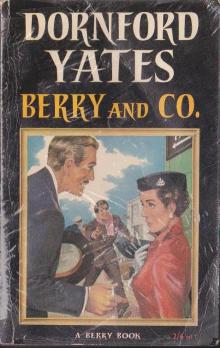 Berry and Co.
Berry and Co.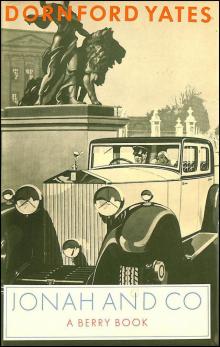 Jonah and Co.
Jonah and Co.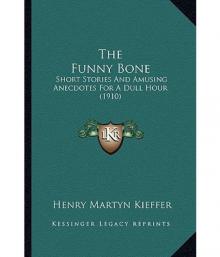 The Funny Bone: Short Stories and Amusing Anecdotes for a Dull Hour
The Funny Bone: Short Stories and Amusing Anecdotes for a Dull Hour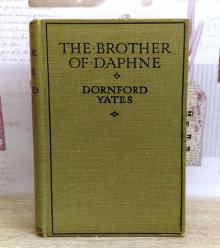 The Brother of Daphne
The Brother of Daphne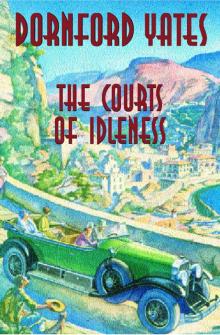 Courts of Idleness
Courts of Idleness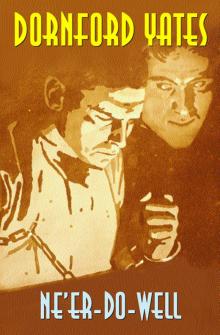 Ne'er Do Well
Ne'er Do Well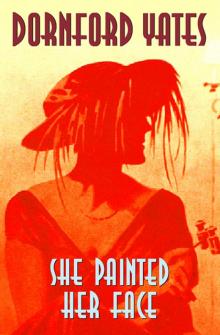 She Painted Her Face
She Painted Her Face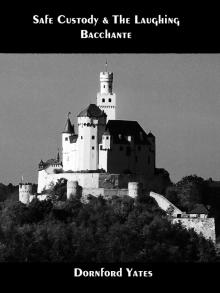 Safe Custody and Laughing Bacchante
Safe Custody and Laughing Bacchante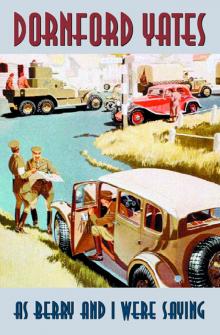 As Berry and I Were Saying
As Berry and I Were Saying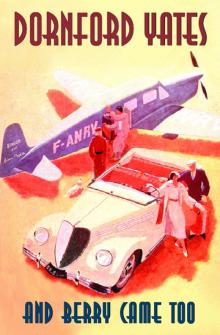 And Berry Came Too
And Berry Came Too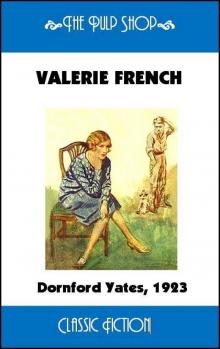 Valerie French (1923)
Valerie French (1923)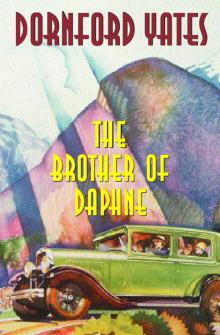 Brother of Daphne
Brother of Daphne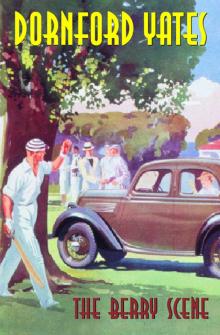 Berry Scene
Berry Scene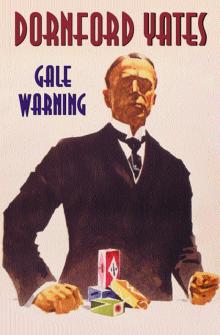 Gale Warning
Gale Warning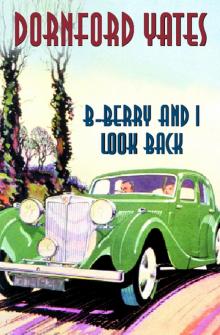 B-Berry and I Look Back
B-Berry and I Look Back Storm Music (1934)
Storm Music (1934)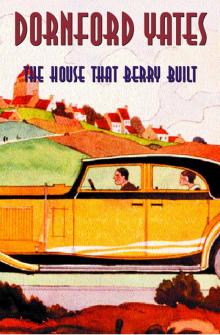 House That Berry Built
House That Berry Built